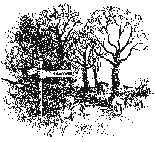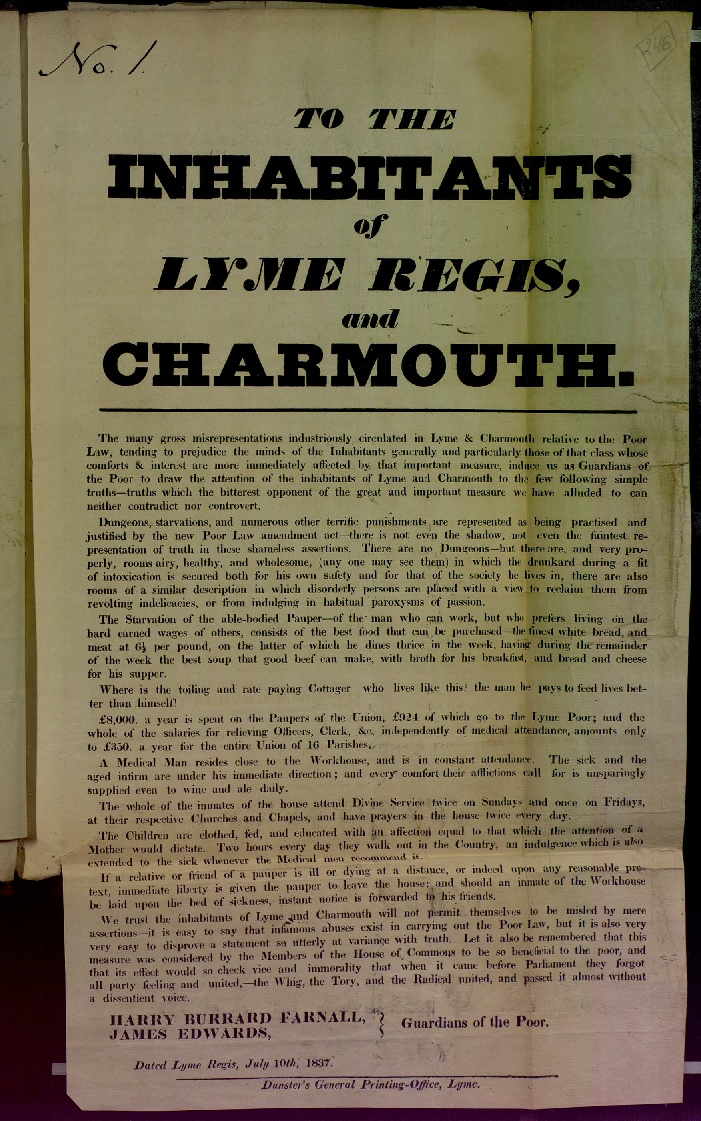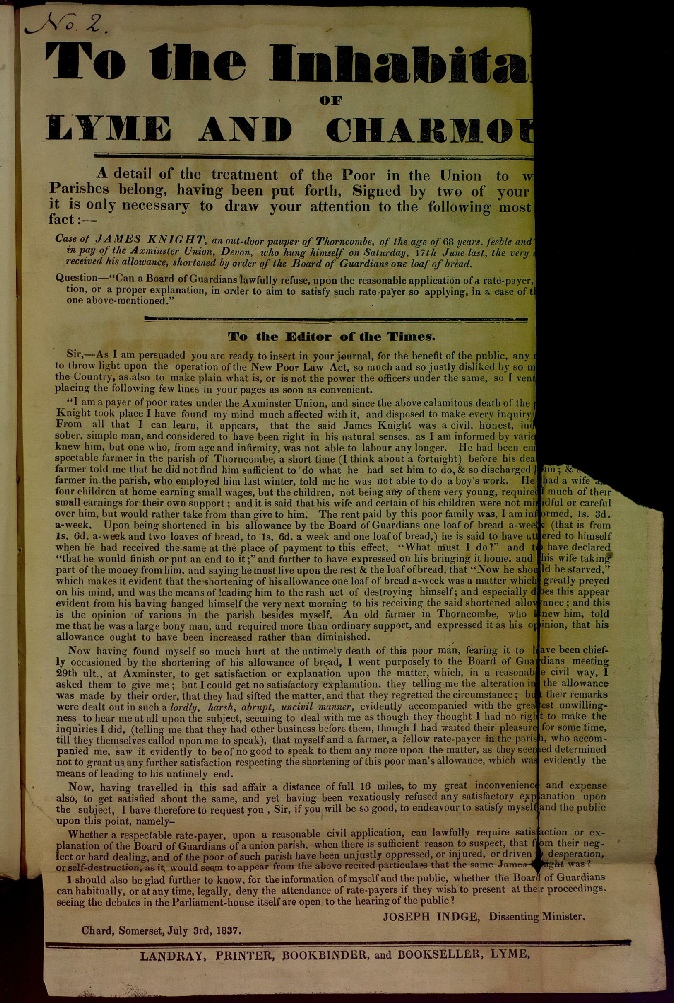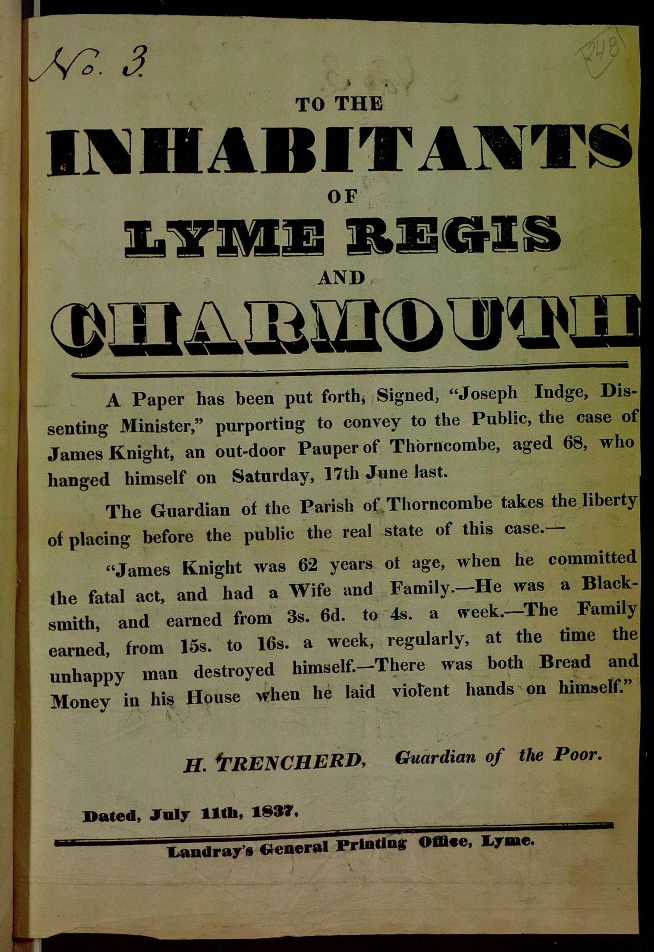




LIVING WITH THORNCOMBE’S POOR
Following the Poor Law Amendment Act 1834, Thorncombe paupers were sent to Axminster
Workhouse. The National Archives (TNA) at Kew houses the correspondence between
the Poor Law Commission and the Guardians of the new Axminster Poor Law Union.
In 2007 the TVT sponsored exploratory meetings between Dr Paul Carter, Principal
Archivist from TNA and a group of local volunteers which included TVT membersTerry
Bennett, John Dalziel, Eve Higgs, Melanie Pierce-
One of 22 local groups across England and Wales it became part of the TNA Living
with the Poor Project. After several training sessions at Thorncombe Sports Club,
also sponsored by the TVT, the group spent the next three years transcribing and
cataloguing Axminster Union Workhouse documents covering the years 1834-
Amongst the material are papers relating to the sale of Thorncombe’s Parish Workhouses and an account of the inquest into the tragic suicide in 1837 of Thorncombe Pauper James Knight. The witness statements conjure a vivid picture of life among Thorncombe’s agricultural labourers during the first half of the 19th century
FOR WANT OF A LOAF
A tenant of John Hockey, James Knight, 68, a former blacksmith lived with his second wife Jane, two sons and two daughters in one room in a house somewhere near the Old Crown at the bottom of Chard Street. The family had lived in Thorncombe for six years.The house is no longer standing.
Mr Knight worked weeding corn for a Mr Fowler, possibly at Grighay, for 3s and 3s 6d per week. He also received 1s 6d and 2 loaves of bread per week in poor relief to supplement his wages. A fortnight before Mr Knight killed himself, he lost his job. Despite seeking work from other farmers none was to be had.
The night before committing suicide James Knight went to the school room along with other parish paupers to collect his ‘dole’ and was told by the Relieving Officer that his bread allowance had been reduced to one loaf a week. On his return home a distressed Knight declared to his family he would starve if he couldn’t find work and would have to go into Axminster workhouse.
The elder of his sons, John , describes how he discovered his father’s body when he came home for his ‘dinner’ at 10 a.m with his mother from ‘weeding corn’ for Mr Aplin at Thorncombe Farm. As his father’s hat and walking stick were on the oven mother and son assumed Knight was upstairs in bed. On checking John discovered his father lying dead on the floor having hung himself. The box in which clothes were kept had been kicked aside.
In his witness statement John Knight explains that his brother, youngest sister [Susan] aged 13 and he share one bed and his parents share their bed with his other sister [Mary Ann]. His brother also works for Mr Aplin and earns 2s3d. His mother earns 7d per day but does not have regular employment. His sisters Mary Ann and Susan work at ‘the Factory’. The only factory listed in the 1841 census is Chaffey in the Synderford valley. It manufactured woollen cloth. The eldest sister earns 3s9d and the younger earns 2s3d weekly. Mr Aplin pays part of John’s wages in kind, a pint of ‘liquor’ in addition to his 6d daily rate, on those days he works. But he cannot work when it rains, so his income is irregular.
The rent for the family’s room is 1s2d week. Mrs Knight takes 9d from the eldest daughter for lodging who ‘diets’ herse lf. The young er daught er and son hand over all their wages to their mother to cover bed and board. John doesn’t pay anything towards the rent.
What John Knight earns barely feeds and clothes him. He says he has never tasted cheese, butter, bacon or meat and lives on dry bread, potatoes and water. He can only work 10 or 11 weeks a year and supports himself between times selling up to six brooms per week at 2d each from materials which he steals.

Handbill dated 10 July 1837, published by Lyme Regis Poor Law Union (TNA Ref: MH12/2095/158)
© The National Archives. Reproduced with kind permission.
James Knight’s suicide attracted a lot of public attention. Also among the inquest papers are three printed hand bills. The Lyme Poor Law Guardians claim that Axminster Union paupers live a life of luxury at the expense of tax payers.

Handbill dated 3 July 1837, published by Joseph Indge (TNA Ref: MH12/2095/158)
© The National Archives. Reproduced with kind permission.
An open letter from a dissenting minister Joseph Indge accuses the Axminster Union
guardians of being instrumental in Knight’s suicide through their withholding relief.
In reply, Thorncombe Poor Law Guardian, Hugh Trencherd, denies responsibility and
points out that the Knight family had a regular weekly income of between15s and 16s
per week and that there was ‘both bread and money in his House when he [James Knight]
laid violent hands on himself’. 
Handbill dated 11 July 1837, published by H. Trenchard. (TNA Ref: MH12/2095/158)
© The National Archives. Reproduced with kind permission.
However, given James Knight had lost his job, that his 1s 6d ‘dole’ was half of what he was used to earning and that both Jane and John Knight were not in regular work, it would seem that Mr Trencherd’s figures are not accurate.
To find out more go to the Living the Poor Life link on The National Archives website
at http://www.nationalarchives.gov.uk/about/living-
EVE HIGGS, PROJECT COORDINATOR
October 2011
.
| History of the Trust |
| Constitution of the Trust |
| Minutes of meetings |
| Archived Minutes |
| Obituaries |
| Recent correspondence |
| Contacts |
| Newsletter |
| Newsletter Archives |
| Past Events |
| Nature Diary |
| Trees |
| Commemorative Trees |
| Johnson's Wood |
| Plants and Flowers |
| Geology and geography |
| Wildlife |
| Birds |
| Chard Junction Nature Reserve |
| Nature Reserve pictures |
| Butterflies |
| Butterfly surveys |
| Photo albums |
| Artists and writers |
| Footpaths |
| General |
| Poor relief |
| Houses |
| In the news |
| Industry |
| Pubs |
| Religion |
| Reminiscences |
| Schools |
| 17th and 18th centuries |
| Harry Banks |
| Pissarro |
| Hedge Dating |
| Once upon a Thorncombe Road |
| Thorncombe's History |
| Thorncombe's Changing Boundaries |
| Parish Poorhouse and workhouses |
| The poor |
| Life in Thorncombe's Workhouse |
| Chard St Bakery & Forge |
| Holway Cottage |
| Forde Abbey |
| Gough's Barton |
| Holditch Court |
| Upperfold House |
| Sadborow Hall |
| Wayside |
| Thomas Place and The Terrace |
| Pinneys |
| Dodgy local ice-cream |
| Gribb arsenic poisoning |
| Industrial relics |
| Westford Mill |
| Thorncombe's Flax and Hemp Industries |
| Broomstick Weddings |
| Royal Oak |
| Golden House |
| St Mary's Church |
| Thorncombe's Chapels |
| Quakers |
| Commonwealth vicars |
| Who was William Bragge? |
| Holditch memories |
| St Mary's School |
| St Mary's School photos |
| Forgotten epidemic |
| Jacobites |
| Walk 1 |
| Walk 2 |
| Walk 3 |
| Walk 4 |
| Walk 5 |
| Walk 6 |
| Walk 7 |
| Walk 8 |
| A Village Walk. Walk 9 |
| Rights of Way information |